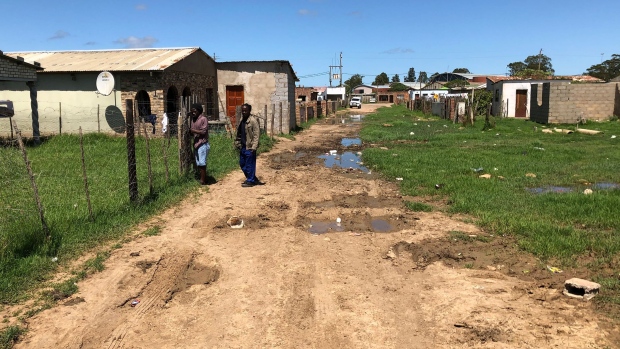Feb 23, 2020
A Shock Court Ruling Could Save South Africa’s Broken Towns
, Bloomberg News

(Bloomberg) -- Raw sewage on potholed streets, piles of garbage on sidewalks and water and power shortages became routine in the South African municipality of Makana. Then something extraordinary happened that could change the face of local government politics.
The High Court last month granted a civil rights group’s application to have the southeastern municipality’s council dissolved because it had failed to provide adequate services and properly manage its operations. Judge Igna Stretch ordered the Eastern Cape provincial government to appoint an administrator to run the district until fresh elections are held.
The unprecedented 117-page decision sent shock waves through the ruling African National Congress, which controls scores of other towns hobbled by corruption and mismanagement. While the judgment is being appealed, the genie is out of the bottle. Community groups in the Enoch Mgijima municipality north of Makana have filed their own lawsuit to disband the council and others may follow suit.
“Democracy has been served,” Ayanda Kota, chairman of the Unemployed People’s Movement, which filed the Makana suit, said in an interview. “The ruling means people have the power to go to court and throw corrupt politicians out of office and elect competent ones.”
Read about auditors of municipalities being threatened
A succession of government reports has shown the mounting risk the 257 municipalities pose to the nation’s finances. Just 18 got clean audits in the year through June 2018, according to the Auditor-General. Local authorities are collectively owed almost 170 billion rand ($11.3 billion) for rates and services, and their inability to collect it from residents who are unable or unwilling to pay means they struggle to settle their own bills.
Finance Minister Tito Mboweni will reveal whether municipalities will get additional funding from the national government when he presents the budget on Wednesday.
Makana Mayor Mzukisi Mpahlwa, who took up his post a year ago, said the court ruling didn’t take account of recent progress made in turning the district of 80,000 people around. About 90% of its debt is being collected, staff are paid regularly and water shortages caused by the worst drought in history are being addressed, he said.
“If this judgment compels us to be dissolved, all the municipalities without exception would be dissolved,” he told reporters. “This will create a very, very difficult situation.”
Brin Brody, the lawyer for the group that brought the suit and a 37-year resident of Makhanda — the district’s main town and home to Rhodes University — said he sees no sign of improvement. His view is shared by the town’s ratepayers and business forums, which backed the case.
“This municipality has destroyed the economy of its own town through mismanagement and inefficiency,” Brody said. “There is no money being spent on infrastructure. There is no management taking place.”
Stormwater drains go uncleared, livestock graze on sidewalks and piped water is on average only available three or four days a week in Makhanda’s suburbs. Property prices have more than halved over the past five years, according to real-estate agent Daphne Timm, who’s worked in the town for the past 24 years.
The neglect is even more acute in Joza on Makhanda’s outskirts, where sewage flows from leaking pipes into yards and dirt streets. The township’s predominantly black and unemployed residents can go for weeks without running water. A mound of trash festers next to a thoroughfare dubbed Pigsty Street by the locals, a monument to the collapse of garbage-collection services.
“We keep on asking them to solve our problems,” said Apollo Phillip, a 49-year-old community activist who’s lived in the area for two decades. “They keep on making promises but nothing happens.”
Ten Joza residents have filed a separate lawsuit aimed at forcing the municipality to tackle the sewage spills. That case, which is being handled by the non-profit Legal Resources Centre, has yet to go to court.
The upsurge in activism in Makana hasn’t translated into immediate political change. The ANC retained control of the municipality in a 2016 vote and has won subsequent by-elections — loyalty it’s engendered by disbursing welfare grants, jobs and housing.
While the main opposition parties, the Democratic Alliance and the Economic Freedom Fighters, have struggled to capitalize on the widespread discontent, the ANC may face opposition from a new movement that’s being set up by residents to contest future elections. The next vote is due in 2021.
“We want to put in place folk who are not going to be responsible to a political master,” said Dittma Eichhoff, a dentist who’s lived in Makhanda for almost 40 years and is helping coordinate the new structure. “This is about citizens sorting out a town.”
President Cyril Ramaphosa admits that municipalities aren’t being adequately managed and has given the job of overhauling how they are run to Nkosazana Dlamini-Zuma, his co-operative governance minister. Planned reforms include appointing experts in all the nation’s 44 districts to advise and oversee several towns, and ensuring officials are appointed on merit.
Read about how fringe towns are falling apart
Pedro Tabensky, director of the Allan Gray Centre for Leadership Ethics at Rhodes University, sees Makhanda’s experience serving as a possible catalyst for change elsewhere.
“We have a model for the rest of the country, a new way of doing democracy that cuts across class and race and ideology,” he said. “I didn’t think this was possible. If we succeed here, who knows what is going to happen?”
To contact the author of this story: Michael Cohen in Cape Town at mcohen21@bloomberg.net
To contact the editor responsible for this story: Paul Richardson at pmrichardson@bloomberg.net, Karl Maier
©2020 Bloomberg L.P.






